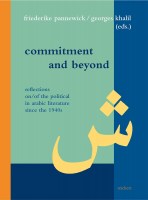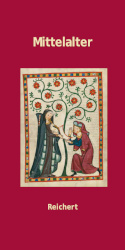Titelsuche
Herausgeber: Pannewick, Friederike; Khalil, Georges
Mitarbeit: Albers, Yvonne
Commitment and Beyond
Reflections on/of the Political in Arabic Literature since the 1940s
Kurze Beschreibung
This book is about relations between literature, society and politics in the Arab world. It is an attempt to come to terms with the changing conceptualizations of the political in Arabic literature in recent modern history. It examines historical and contemporary conceptions of literary commitment (iltizām) and how notions of ‘writing with a cause’ have been shaped, contested, re-actualized since the 1940s until today. Against the backdrop of the current social and political transformations in the Arab world, questions on the role of the arts, specifically literature and its politics, arise with immediacy and require profound reflection and analysis.Ausführliche Beschreibung
This book is about the relations between literature, society and politics in the Arab world. It is an attempt to come to terms with the changing conceptualizations of the political in Arabic literature (and to a certain extent theater and the visual arts) in recent modern history. It examines historical and contemporary conceptions of literary commitment (iltizām) and how notions of ‘writing with a cause’ have been shaped, contested, re-actualized since the 1940s until today. Starting with the present day, it looks at literary practices during the ‘Arab Spring,’ then tracks back to the beginnings of literary politicization during the 1940s and 1950s, subsequently crosses the historical caesura of the late 1960s to consider competing re-conceptualizations of literary engagement in the 1970s and 1980s, before finally returning to the 1990s through to 2011. The chapters reexamine critically both current and historical notions of the political in modern Arabic literature as well as the legacy of iltizām as a term and an agenda. They discuss literary commitment not solely as a (completed) period in Arabic literary history but also as a vivid, changing and continuing idea that questions the role of literature and the author in and for a society.Even though a number of seminal research volumes have been published on the conceptual history of Arab literary engagement in English language, there remain no book-length studies on the ongoing relationship between the literary and the political from the 1940s until today. Therefore, what makes this volume unique and outstanding is, firstly, its point of departure in approaching the question of the ‘new political’ in Arabic literature through an interrogation of iltizām’s longevity as both a historically adaptable and adaptive literary concept—something which the ‘Arab Spring’ has forcefully brought back to our minds. Secondly, this volume brings together the attempts, propositions, and research results of both established and upcoming scholars in the field of modern Arab literary and cultural history, all of whom have initiated and undertaken exceptional contributions regarding the issue. As such, this book fills a gap in the field of Arabic Literary Studies as it explicitly reconsiders the legacy of Arab literary commitment and its manifold and heterogeneous conceptions in the light of recent and present day developments.
Rezensionen
„Since 2011, ’the political’ has (again) become ubiquitous in all forms of Arab culture. At the same time many critics have questioned the role of writers and intellectuals. Did they play a role in stoking the popular uprisings? If not, and literature had indeed become somehwat disconnected from social change, what is its relevance? [...] Frederike Pannewick, Georges Khalil and Yvonne Albers’ timely volume approaches these questions through a sustained discussion of the term iltizam (engagement). Building on the pioneering work of Verena Klemm, the book presents twenty-two essays that track literary commitment from the 1940s to the present day. The authors represent a German-Arab network of literary scholars whose research has been developed concomitantly over decades. [The book] opens onto sociological questions of historical memory and the role literature might play in working through collective experiences, making [it] relevant beyond the field of literary studies. [...]The first section of the book, “Of poetics and Politics: Revolution and Literary Commitment,“ starts in the present with three articles on the Egyptian revolution of 2011. [...] The volume’s second section, “Roots of a Discourse: Historical Concepts of Literary Commitment,“ focuses on the watershed year of 1967. [...] The books third section, “Refiguring iltizam: Literary Commitment after 1967,“ focuses on what became of commitment in a literature that is sometimes interpreted as uncommited and de-politicized. [...] [The book] presents a number of fresh analytical angles and new, previously undiscussed, authors, espacially in the fourth and final section of the book, “Commitment or Dissent? Contemporary Perspectives.“ Here, the volume returns to the present with seven articles on literary and artistic works produced since the 1990s. They probe globalization, cultural disorientation, the impact of new social movements and political questions after the financial crisis, and the fragmentation of literaty forms in the age of social media. [...]
The most exciting aspect of Commitment and Beyond is its ambitious attempt to connect contemporary changes in artistic production - confusing and multi-facetted as they may be - to the history of the 20th century, pushing other disciplines in Middle East studies to consider how historical events and figures are continuously reinterpreted.“
Von: Sune Haugbolle (Roskilde University)
In: Journal of Arabic Literature 48, (2017), S. 205-209.
Autoreninfo
Friederike Pannewick is Professor for Arabic Literature and Culture at the Philipps-Universität Marburg, Center for Near and Middle Eastern Studies (CNMS), and co-director of the research field “Travelling Traditions: Comparative Perspectives on Near Eastern Literatures” within the research program “Europe in the Middle East – the Middle East in Europe” (EUME) at the Forum Transregionale Studien Berlin and director of the research group “Figures of Thought | Turning Points. Cultural Practices and Social Change in the Arab World” at CNMS. She is co-editor of the series “Literatures in Context: Arabic – Persian – Turkish” (Reichert) and has published extensively on modern Arabic literature and theater.Georges Khalil works at the Wissenschaftskolleg zu Berlin and is the Academic Coordinator of the Forum Transregionale Studien. He is also responsible for “Europe in the Middle East – The Middle East in Europe” (EUME), a research program that seeks to rethink key concepts and premises linking and dividing Europe and the Middle East. He was previously the coordinator of the “Working Group Modernity and Islam” from 1998 to 2006 at the Wissenschaftskolleg zu Berlin, and studied History and Islamic Studies in Hamburg and Cairo, as well as European Studies at the Europa-Kolleg Hamburg. From 1995 to 1996 he was fellow of the College for International Affairs, Robert Bosch Foundation.
Yvonne Albers studied Philosophy, Theater Studies, and Arabic Studies in Leipzig and Damascus. She is currently a Research Associate at the Center for Near and Middle Eastern Studies (CNMS) at Philipps-Universität Marburg and a member of the research group “Figures of Thought | Turning Points: Cultural Practices and Social Change in the Arab World” (DFG). While her former work was concerned with contemporary theater and performance art in Lebanon, she is now writing a PhD on the Beirut-based cultural magazine Mawāqif and post-1967 aesthetic thought. Albers is also co-founder and editorial board member of the open access journal Middle East – Topics & Arguments.
Reihentext
Diese Reihe stellt innovative Arbeiten zu den nahöstlichen Literaturen in ihren verschiedenen Epochen und Gattungen vor. Sie versteht sich nicht ausschließlich als ein Forum für Orientwissenschaftler, sondern möchte auch Komparatisten, Literaturwissenschaftlern und einer interessierten Öffentlichkeit Einblicke in das breite Spektrum gegenwärtig produzierter und rezipierter Literatur des Nahen Ostens bieten.
Denn die Herausgeberinnen, Autorinnen und Autoren wollen den Titel der Reihe programmatisch verstanden wissen. Sie gehen von einem Begriff der Weltliteratur aus, der die orientalischen Literaturen nicht nur statisch einbegreift, sondern sie in ein Kulturregionen und Nationalsprachen übergreifendes Spannungsfeld stellt, dessen Dynamik erst im interdisziplinären Austausch erfasst werden kann. Sie gehen ferner davon aus, dass Literaturen in vielfacher Weise intertextuell geprägt sind, dass sie Lektüren verschiedenster vorausgehender Texte darstellen und daher erst in ihrem „lokalen historischen Kontext“ ihren Reiz als Ausdruck einer regional geprägten Ästhetik entfalten können. Die Reihe versucht so, einer neuen Sensibilität für mythische, archetypische, aber auch historische Subtexte in der nahöstlichen Literatur Bahn zu brechen, sie aber gleichzeitig als wichtigen Ausdruck einer globalen kulturellen Mobilität sichtbar zu machen.




 Vorwort
Vorwort

 Neuerscheinungen 2023/2024
Neuerscheinungen 2023/2024
 Gesamtverzeichnis 2023/2024
Gesamtverzeichnis 2023/2024
 Katalog Oriental Studies & Linguistics
Katalog Oriental Studies & Linguistics
 Mittelalter
Mittelalter
 Deutsche Inschriften
Deutsche Inschriften
 Musiktherapie
Musiktherapie
 Literaturen im Kontext
Literaturen im Kontext